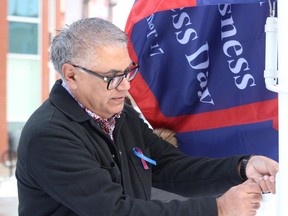Top Stories
Indigenous Art Brand Triumphs in Urgent Copyright Battle

UPDATE: A Vancouver-based Indigenous art wholesaler, Native Northwest, has just won a significant copyright infringement lawsuit against Sasquatch Gifts and Souvenirs, a local souvenir shop. The ruling, announced on November 17, 2023, confirms that the shop knowingly sold t-shirts featuring a design closely resembling the work of renowned Coast Salish artist, Dr. Francis Horne, Sr.
This victory marks a crucial moment in the ongoing battle against Indigenous art theft in Canada. Native Northwest stated that it has been a “gruelling” three-year process to reach this outcome. The Federal Court of Canada determined that Sasquatch Gifts had unlawfully reproduced and sold Horne’s original design without consent.
In a powerful statement shared on social media, Native Northwest emphasized the gravity of the situation: “Indigenous art theft is a serious problem, yet there are currently no special laws to prevent fraudulent Indigenous art from being created or sold in Canada. It is our hope that this judgment will provide legal precedent against Indigenous art theft and appropriation.”
Horne, who has dedicated more than 50 years to his craft, expressed deep emotional distress upon discovering his artwork being sold without permission during a visit to Harrison Hot Springs in 2022. “As soon as we stepped in the door of the gift shop, lo and behold, there’s my design,” Horne recounted in a video posted by Native Northwest. “It literally made me sick to my stomach.”
After months of efforts to have the unauthorized t-shirts removed from the shelves, Native Northwest reported receiving minimal response from the Fearons, owners of Sasquatch Gifts. Following the lawsuit announcement, the souvenir shop faced a barrage of negative attention, suffering 12 consecutive one-star reviews on Google, which initially dropped their rating to just 1.5 stars. As of the latest update, their rating has improved to 3 stars, but many reviews referencing the lawsuit appear to have been removed.
The Sasquatch, referred to as “sasq’ets” in the local First Nations language of Halq’emeylem, is a revered spiritual figure in the Sts’ailes First Nation, where Harrison Hot Springs is located. This cultural significance adds another layer of complexity to the case, highlighting the importance of protecting Indigenous heritage and artistry.
As the impact of this ruling reverberates through the community, Native Northwest and other Indigenous artists hope this landmark decision will inspire further actions against art theft. The case underscores the urgent need for stronger protections surrounding Indigenous art and the necessity for artists to assert their rights.
The public’s response to the case reflects a growing awareness of the issues surrounding Indigenous art theft, and many are now more vigilant about supporting authentic Indigenous creators. As this situation continues to unfold, all eyes will be on how it influences future legal battles and the broader fight against cultural appropriation.
Stay tuned for more updates as this story develops and as Indigenous artists continue to advocate for their rights and recognition in the face of theft and appropriation.
-

 Politics2 weeks ago
Politics2 weeks agoSecwepemc First Nation Seeks Aboriginal Title Over Kamloops Area
-

 World4 months ago
World4 months agoScientists Unearth Ancient Antarctic Ice to Unlock Climate Secrets
-

 Entertainment4 months ago
Entertainment4 months agoTrump and McCormick to Announce $70 Billion Energy Investments
-

 Lifestyle4 months ago
Lifestyle4 months agoTransLink Launches Food Truck Program to Boost Revenue in Vancouver
-

 Science4 months ago
Science4 months agoFour Astronauts Return to Earth After International Space Station Mission
-

 Technology3 months ago
Technology3 months agoApple Notes Enhances Functionality with Markdown Support in macOS 26
-

 Top Stories1 month ago
Top Stories1 month agoUrgent Update: Fatal Crash on Highway 99 Claims Life of Pitt Meadows Man
-

 Sports4 months ago
Sports4 months agoSearch Underway for Missing Hunter Amid Hokkaido Bear Emergency
-

 Politics3 months ago
Politics3 months agoUkrainian Tennis Star Elina Svitolina Faces Death Threats Online
-

 Politics4 months ago
Politics4 months agoCarney Engages First Nations Leaders at Development Law Summit
-

 Technology4 months ago
Technology4 months agoFrosthaven Launches Early Access on July 31, 2025
-

 Top Stories4 weeks ago
Top Stories4 weeks agoFamily Remembers Beverley Rowbotham 25 Years After Murder




















